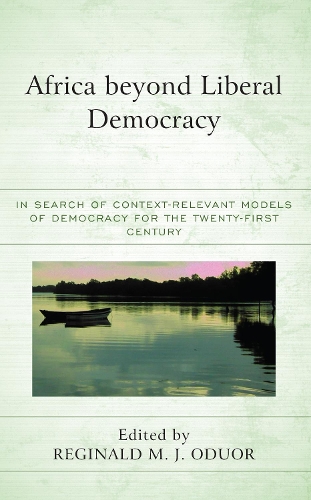
Africa beyond Liberal Democracy: In Search of Context-Relevant Models of Democracy for the Twenty-First Century
(Hardback)
Publishing Details
Africa beyond Liberal Democracy: In Search of Context-Relevant Models of Democracy for the Twenty-First Century
By (Author) Reginald M.J. Oduor
Contributions by Moses Oludare Aderibigbe
Contributions by Emmanuel Ifeanyi Ani
Contributions by Christine Buluma
Contributions by Tayo Raymond Ezekiel Eegunlusi
Contributions by Emefiena Ezeani
Contributions by Sirkku K. Hellsten
Contributions by Dennis Masaka
Contributions by Thomas Menamparampil
Contributions by Kisemei Mutisya
Bloomsbury Publishing PLC
Lexington Books/Fortress Academic
21st June 2022
United States
Classifications
Professional and Scholarly
Non Fiction
Political structures / systems: democracy
320.46
Winner of Outstanding Academic Title 2023
Physical Properties
Hardback
298
Width 160mm, Height 227mm, Spine 29mm
626g
Description
Africa beyond Liberal Democracy: The Quest for Indigenous Models of Democracy for the Twenty-First Century addresses the fate of liberal democracy in Africa. At the dawn of political independence in the late 1950s and early 1960s, many countries in Africa set out with liberal democratic constitutions. However, these were quickly dismantled by civilian regimes that turned their countries into one-party autocracies, or by military coups that set aside the constitutions altogether. The 1990s saw an attempt at reverting to competitive multi-party politics through the so-called second-generation constitutions, but these are again being dismantled by civilian autocracies and military juntas.
In this collection, edited by Reginald M. J. Oduor, African and Africanist scholars point out that what has failed in Africa is liberal democracy rather than democracy as such, because liberal democracy arose in an individualist socio-political Western context that is significantly different from the communalist milieu of African societies. They call for alternative trajectories of democratization that are responsive to the socio-political realities on the continent. The contributors, who come from South Africa, Zimbabwe, Kenya, Uganda, Tanzania, Nigeria, Ghana, India, Sweden, and Finland, present a range of perspectives on possible directions for context-relevant models of democracy in the various countries of Africa in the twenty-first century.
Reviews
This is an important book, both challenging and humble, that never loses its sight on an incredibly important question for the continent: How applicable is liberal democracy for Africa.... Perhaps more impressively, the edited volume is equally dedicated to three parts: one fully justifying the Africa Beyond Liberal Democracy Project; one offering critiques of the project--something rarely done in works today, unfortunately; and one examining a host of diverse, individual proposals for context-relevant African models of democracy. Consequently, the volume sets the table completely and humbly seeks to offer real answers to deep philosophical questions. This is no standard "woke" piece of scholarship that simply wants to blame all of contemporary Africa's problems on historical colonialism and neocolonialism. Rather, it accurately shows how this historical legacy still matters while not bowing to a rigid path for moving forward. As such, it is a welcome addition to the literature. Highly recommended. Undergraduates through faculty; professionals; general readers.
Author Bio
Reginald M.J. Oduor is senior lecturer in philosophy at the University of Nairobi.
